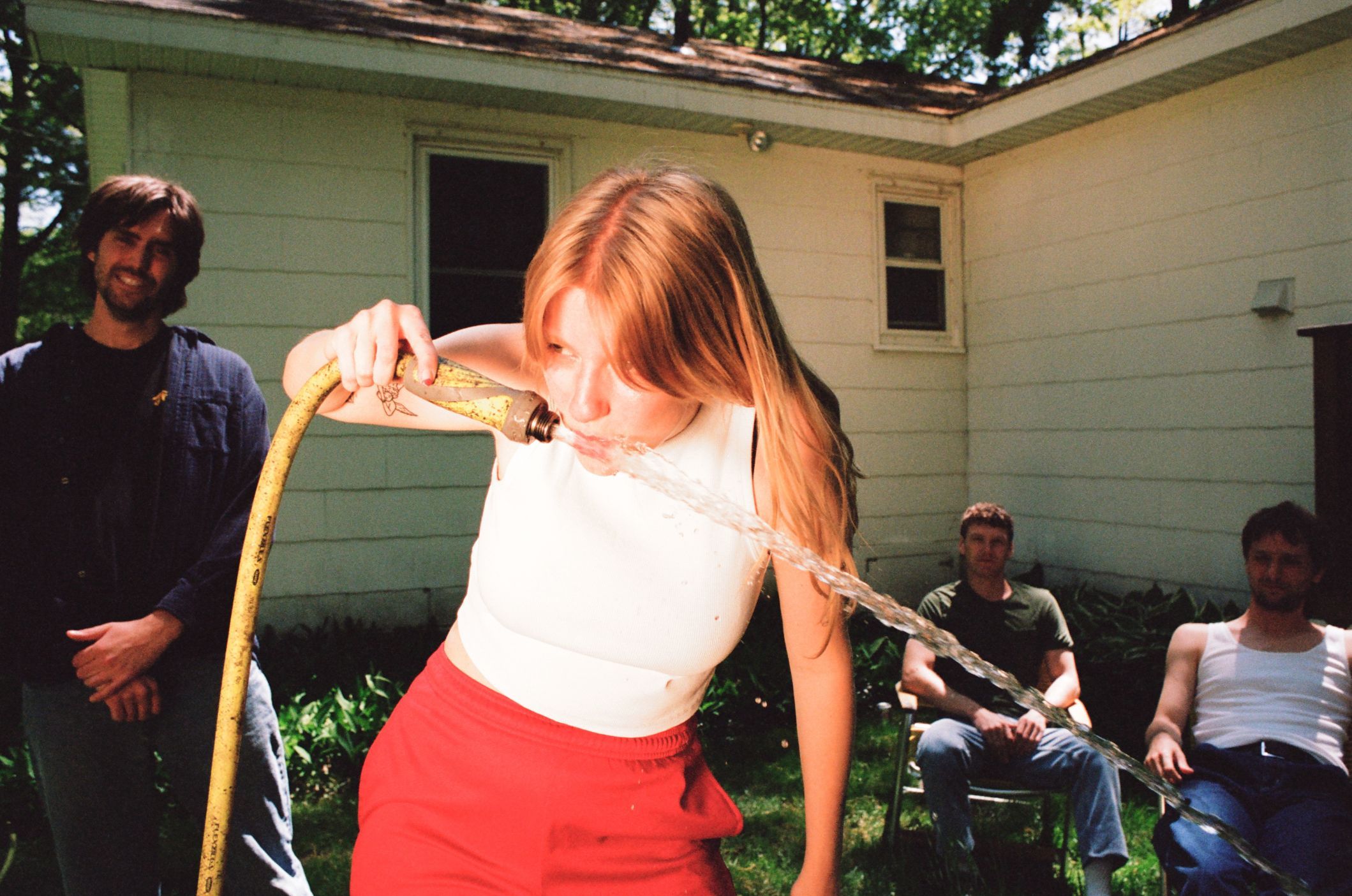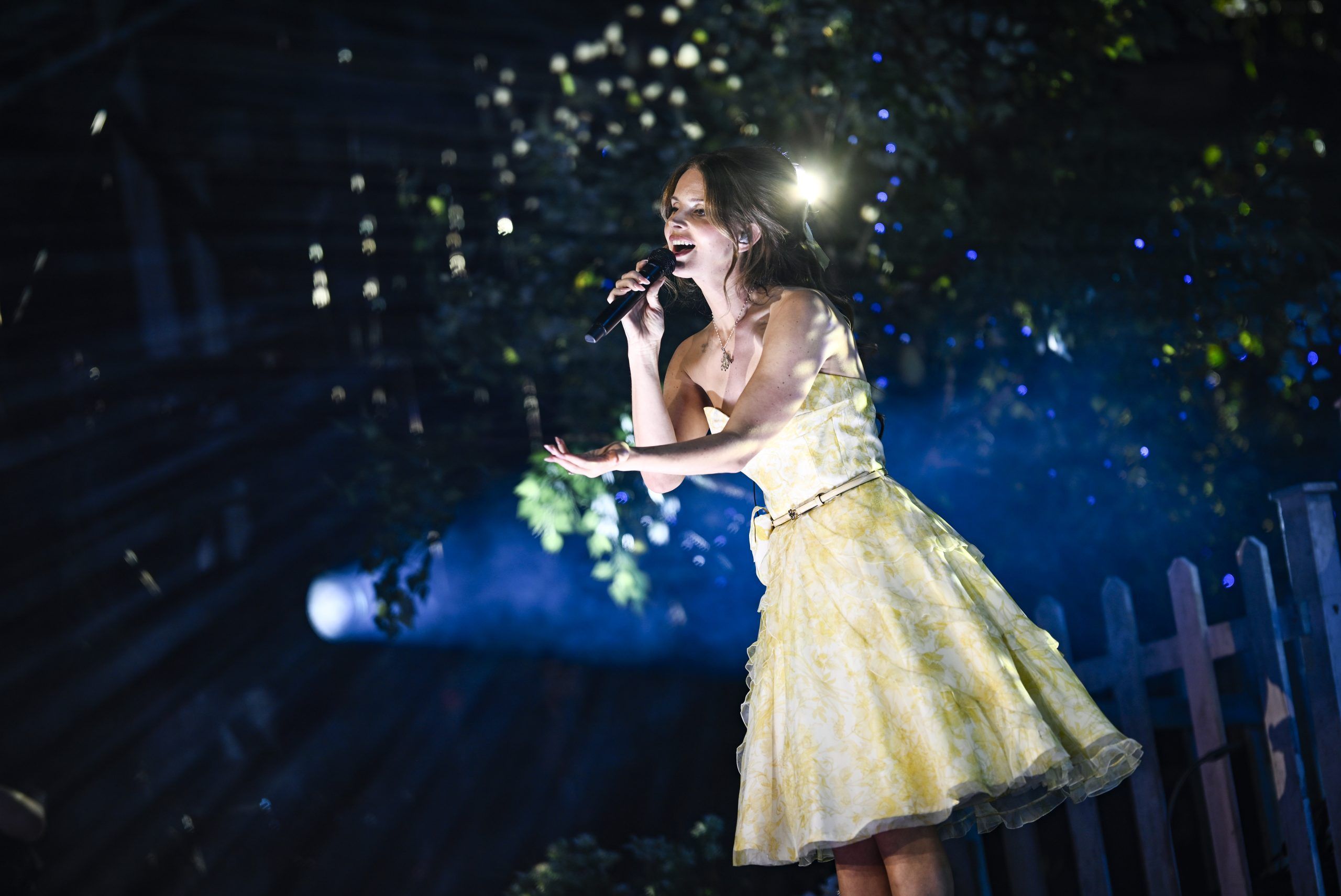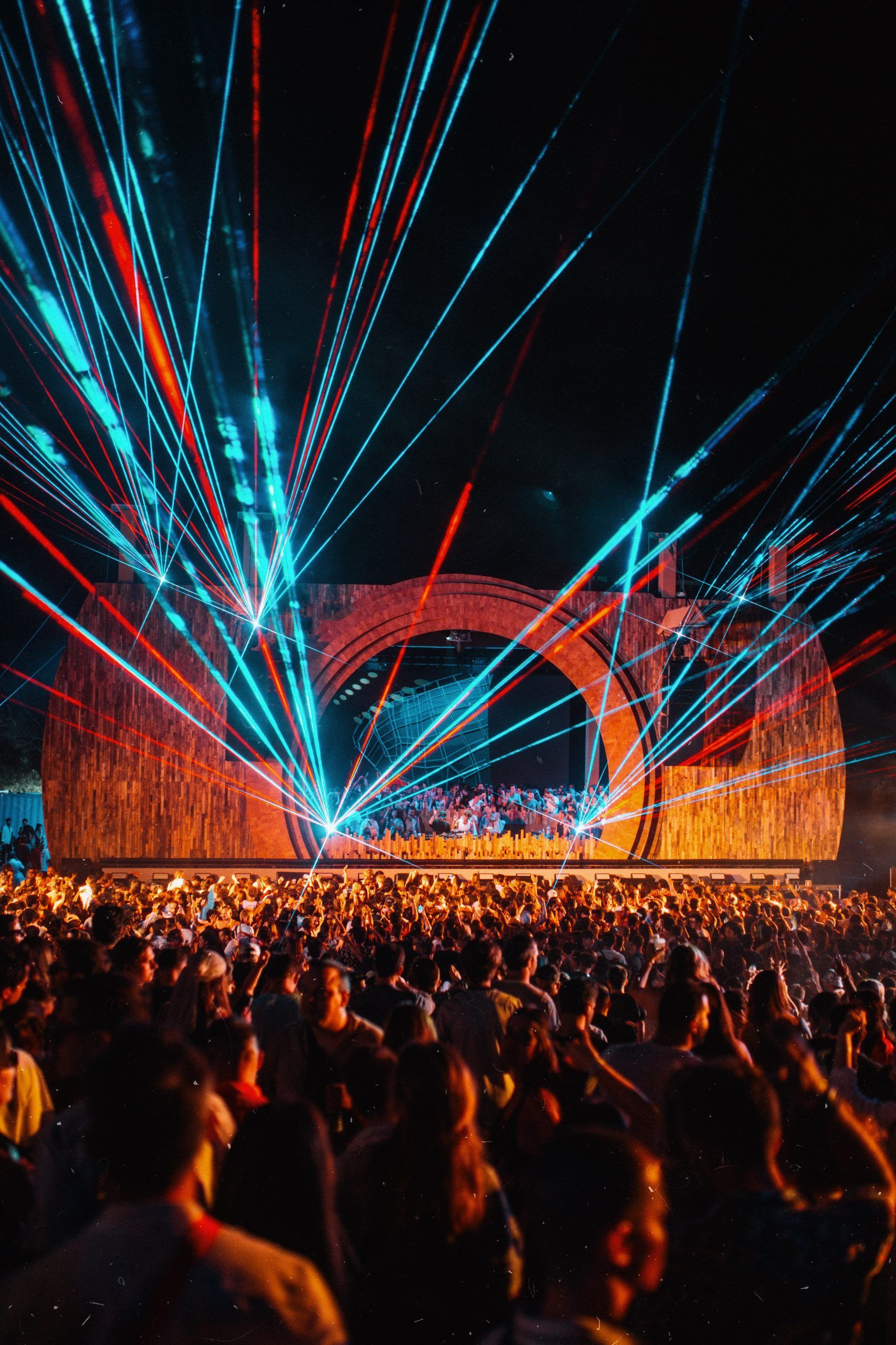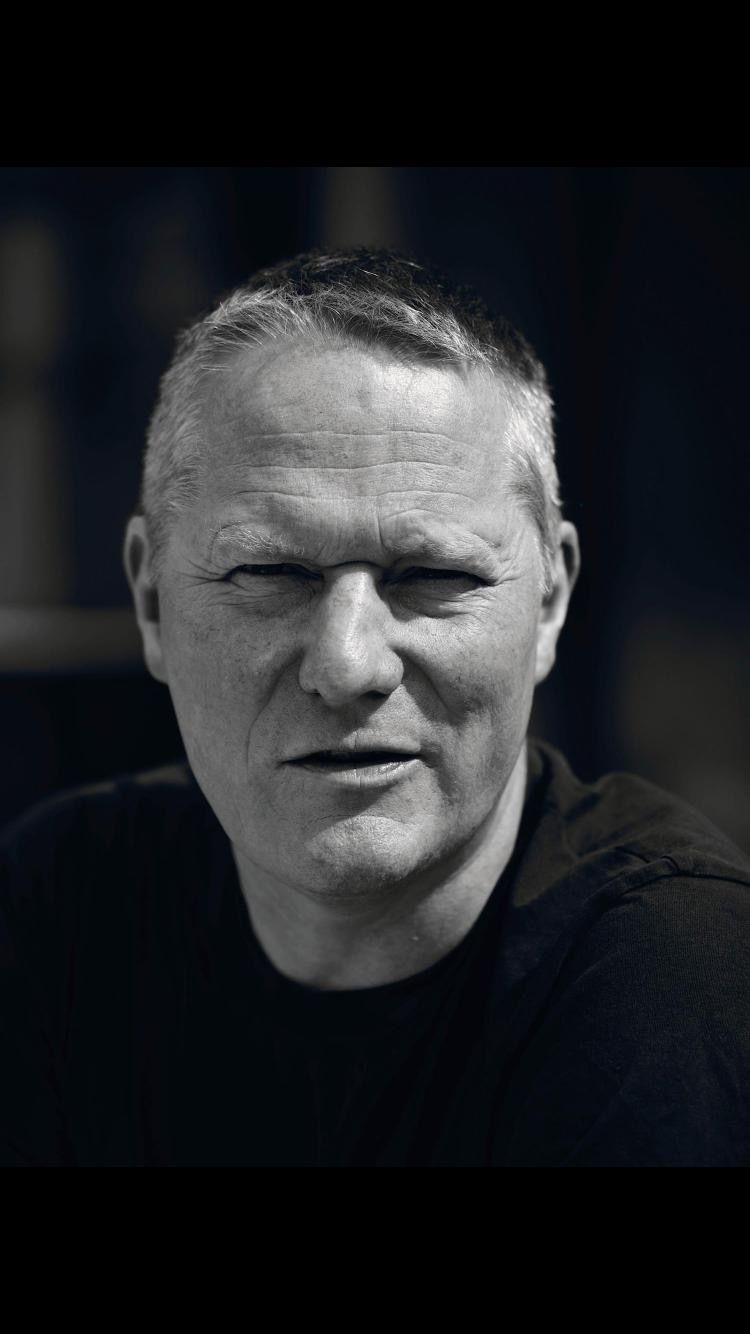Slow Pulp’s latest album, Yard, takes listeners on a journey – through highs, lows, and everything in between. Their usual sound has shifted from traditional indie rock, into indie rock with a bit of a country twang. It’s Americana for the modern age. For a band that seems to talk in a secret code with one another to create their music, those songs are instantly made understandable to listeners. They speak about silver songs that they want to turn purple, tracks that need more of a dusty, desert brown. On paper that might not be the easiest to understand, but as a listener, it all shines through. Yard puts sound to the feelings we all have but struggle to express. Those highs and lows and all the nuance of the in-betweens are rendered into song with a harmonica gently playing in the background.
In conversation with 1883, Slow Pulp’s lead singer, Emily Massey talks about writing the record at a family friend’s cabin in Wisconsin, what it’s like to collaborate with her bandmates as well as her father, and their upcoming headlining tour.
Hey! How are you?
I’m good. I’m in the car right now. We’ve just been rehearsing, getting ready for the tour.
Yeah! It’s coming up so fast.
Yeah, so fast.
Well, thank you so much for meeting with me today. I’m so excited to talk with you. I’ve been listening to Slow Pulp for years now. My roommate was so excited I was interviewing you. I love this new record top to bottom. It has such a great mix of up-tempo fun songs and slower moodier tracks. I also really enjoyed that this album has a bit more of a country twang to it. One tidbit from the press release that I really enjoyed was that the chords from Slugs came from a song that Henry Stoehr had written for a crush in the sixth grade. I thought that was so cute and so sweet and it made me think more broadly about the writing process as a whole for this record. How did you pull all the different components of everything together?
Yeah, so each I mean, each song really kind of has a different story, I’d say. I think overall what normally happens or what normally happened for this record, at least is that someone would have a chord progression. Either I would start one or one of my bandmates would start one. I would then take it and write a melody and lyrics over it. The base of the song would be kind of figured out that way. It was important to me that those songs felt good without any other elements added to them. It felt like a finished song if it stayed that way. All the extra stuff becomes so much more fun because the base feels like it’s in a solid place.
I think that’s also why some of the songs kind of ended up having that country, or more Americana Folk feel to it – the demo version of it was so sparse. But then some of the songs are different, like Cramps or Worm, for example. Cramps came out of a jam session – we were just kind of messing around and it all kind of happened at once. The different processes create different sounds for us. That’s how we’re able to get a song like Cramps and then a song like Fishes on the same album.
How do you collaborate as a group? It can be such a tricky territory to navigate. You’re coming in with the base of the track done. How do you bounce ideas off of one another? How does that process work?
Yeah, so after the chords and the melody is written, I’ll bring it back to the band and we’ll just kind of flesh out our individual parts a little bit more or just kind of jam on what the energy of that song is portraying. Sometimes they change. MUD, for example, started out way slower and kind of lethargic and folk-based and then it turned into this totally different thing. And I think that happens just kind of naturally, I think it’s hard to even pinpoint a specific way in which we do it because it’s almost an unspoken thing between us. Sometimes it’ll be really laborious over a certain production part or a keyboard part and figuring out what the right thing is. I feel like we’ve gotten better and are getting better at figuring out what and when to add parts. Henry [Stoehr], the guitar player did the production on the album. So, once we got tracks to the place of having, you know, a drum part and there’s a bass part and there’s a couple of guitar parts, and [the producers] would take it and add all the fun Easter eggs in. I think we are good at just working together. I mean, of course, we have our moments of arguing for half a day over one tiny part, you know, and figuring out what the right thing is, but there are always compromises you make. And the final product is what we all believe was meant to come out in some way.
What do you find most inspirational when it comes to songwriting?
Hmm, that’s a good question. For me what I did in this album, I went to a family friend’s cabin in northern Wisconsin that’s on a lake. I would go up there and just spend time completely alone and completely isolated. And I felt like I was able to create music and put less pressure on myself. I felt like being alone allowed me to be more vulnerable with myself, and more kind of potent with my emotions. Like I would just go up there, spend a day crying about something and then I’d write a song afterwards. It was this kind of cathartic thing. I think just being in that space, being in Wisconsin was really inspiring. It’s different though. You think “Oh, a Wisconsin musician goes to a cabin… It’s Bon Iver.” But I feel like it’s a different brand of cabins, in a more adolescent kind of way. There are scooters and a ping-pong table and a boat. It feels maybe even suburban rather than a romantic wood-burning stove, log cabin in the woods. It’s a little bit more playful, I guess. That space definitely helped me to just kind of let things come out. Whether I was conscious of it or not.
Were you surprised by any of the things that came out?
Yeah, I think so. I think the song Yard, which is the titular track, that one kind of surprised me in terms of how it came out. I think it differs from a lot of the other songs because it’s a bit more storytelling, and the lyrics are a bit more visual and specific than I normally go with my writing. I found that to be really fun. I hear that song, or even when we’re practicing that song, I get the most emotional just being involved in it again. It’s just so closely tied to my family and you know, just like getting through hard times together and reckoning with your past behaviour and decisions.
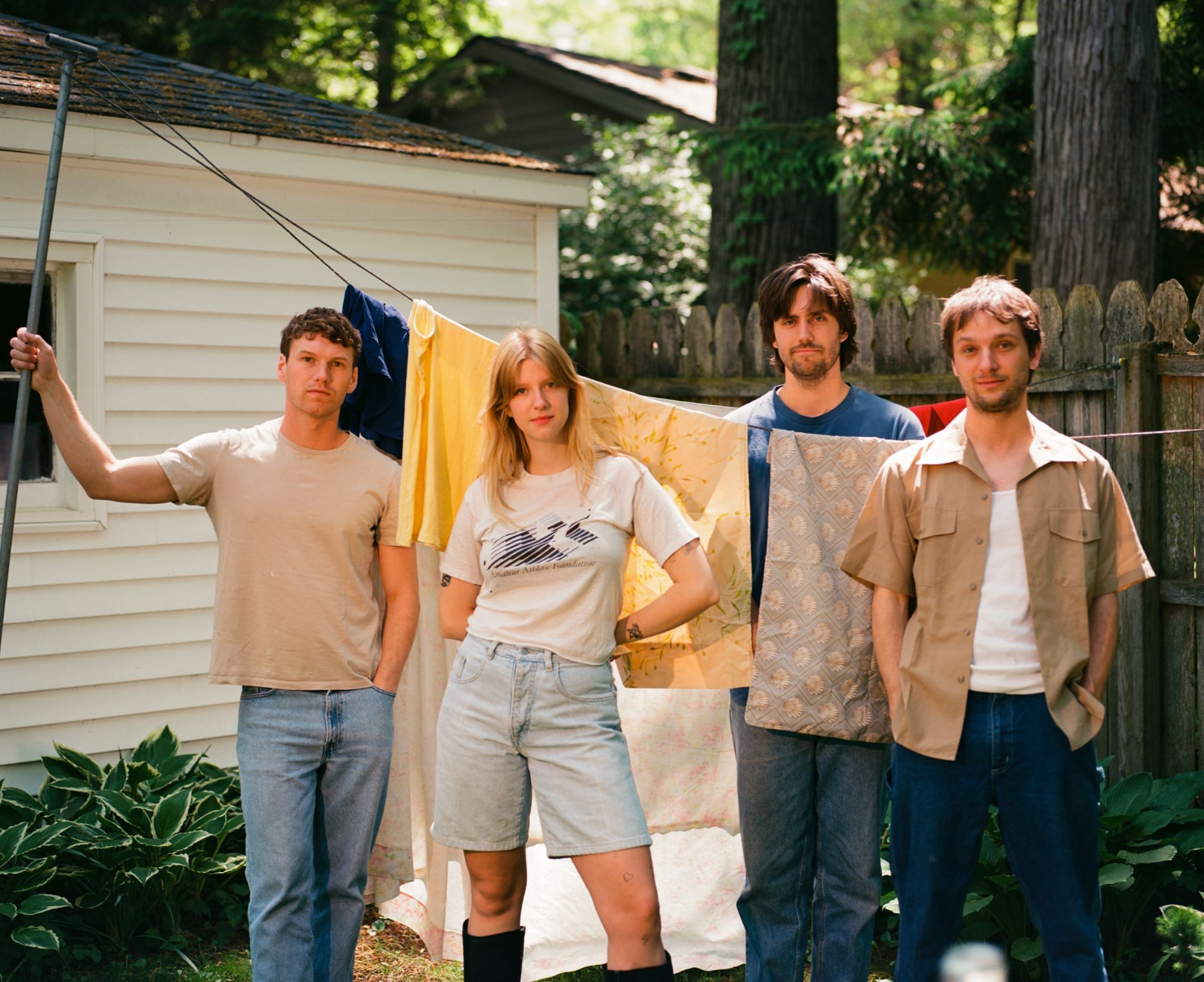
This record has been described as much more intentional. What components were you guys being more intentional with? Was it in vision and vibe, or more intentional in the kinds of songs that are being written?
I think the process and how we were gonna go about making another record. When we made our first record, it was really just trying stuff because it was our first time making a full length and we didn’t know how to do it and it still feels like we kind of don’t know how to do it. You learn something each time. But I think there are a lot of things that we learned while making Moveys that we knew for sure we were going to take and use for this next record. One of them is the space to write in isolation. One of them was the fact that I got to record with my dad again. Which was really cool.
My dad’s a musician and we record all my vocals at my parent’s house and he engineered them and it was nice. We’re very close. So he’s able to kind of pull out a certain emotional quality or push me into a direction that I need. And also tell me when to stop which is very important, because I can get very intense in the process. Other than that, it was just again, trying to be exploratory about songwriting and working together and see what came out of that. I think because of that process, there’s intentionality but there’s not too much which, you know, can be different for each band or artist. But for us, I think it creates a product that does have a lot of diversity in the genres. And I think that’s kind of fun and becoming something that is Slow Pulp, you know. It’s having curveballs I guess.
It felt really authentically Slow Pulp. Nothing about it felt like, “Oh, here we go, they’re trying something new.” It all just felt organic throughout. It felt like growth.
We tried!
It works! I want to talk a little bit more about working with your dad. He helped on the last record as well. What was the process of working with him on this one?
Yeah, so my parents moved from Madison to farm country in rural Wisconsin. And my dad has a little studio in their house. It was such a nice space to be. It felt kind of full circle to be able to record the vocals in it in an isolated space, on this rural landscape. Outside of recording, it felt really nice to be surrounded by quiet and peace. My dad’s a singer. He’s a musician and he’s great at giving advice and tips on how to maybe deliver a vocal differently or open up my voice in a different way. And he can hear such small minute details that I don’t even notice what I’m doing in my own voice. He’d be like, “You should try this,” or, “Keep going in that direction.” It’s also complicated working with family. I think we have a kind of funny relationship. It’s not all sweet and roses. We will definitely argue about stuff which is funny, because I think we can get into full-fledged fights while we’re working together. But because we’re family we get over it. We work it out. I remember specifically getting in arguments the most about the harmonies I wanted to do, and he’d be like, “That harmony is weird, it sounds medieval or something.” and I’m like, “Well, it’s my song. Not your choice.” I’d get really petty about it sometimes.
How do you know when to take his advice on when to listen to yourself though?
I think I’m stubborn with him. And I think in my mind I’m always right. It’s the moments when I feel a little bit lost that I’ll think about asking him for insights. Our relationship has grown into him giving me advice when I’m in search of it, rather than unsolicited, “You should do this.” Because that makes me pretty mad.
Yeah, like screw you. This is my song!
Yeah, exactly. And I’m not really like that with my bandmates. There’ll be stuff. I’ll be like, “Oh, what about this?” and it’ll be more of an exploratory thing. But for some reason, when it’s your dad telling you to do something, it’s like the rage starts to fuel up.
Yeah, exactly. I don’t know how you did that. And it was not just one album that you did with a parent!
I know. And I do it again somehow. I don’t even know how to explain it. But it does work out in the end.
Well, clearly, it’s a great record. And the last one was good too. I find that so interesting though. I guess you learn about your relationship with your dad too.
Yeah, definitely. I’m like, I need to work this out more in therapy [laughs].
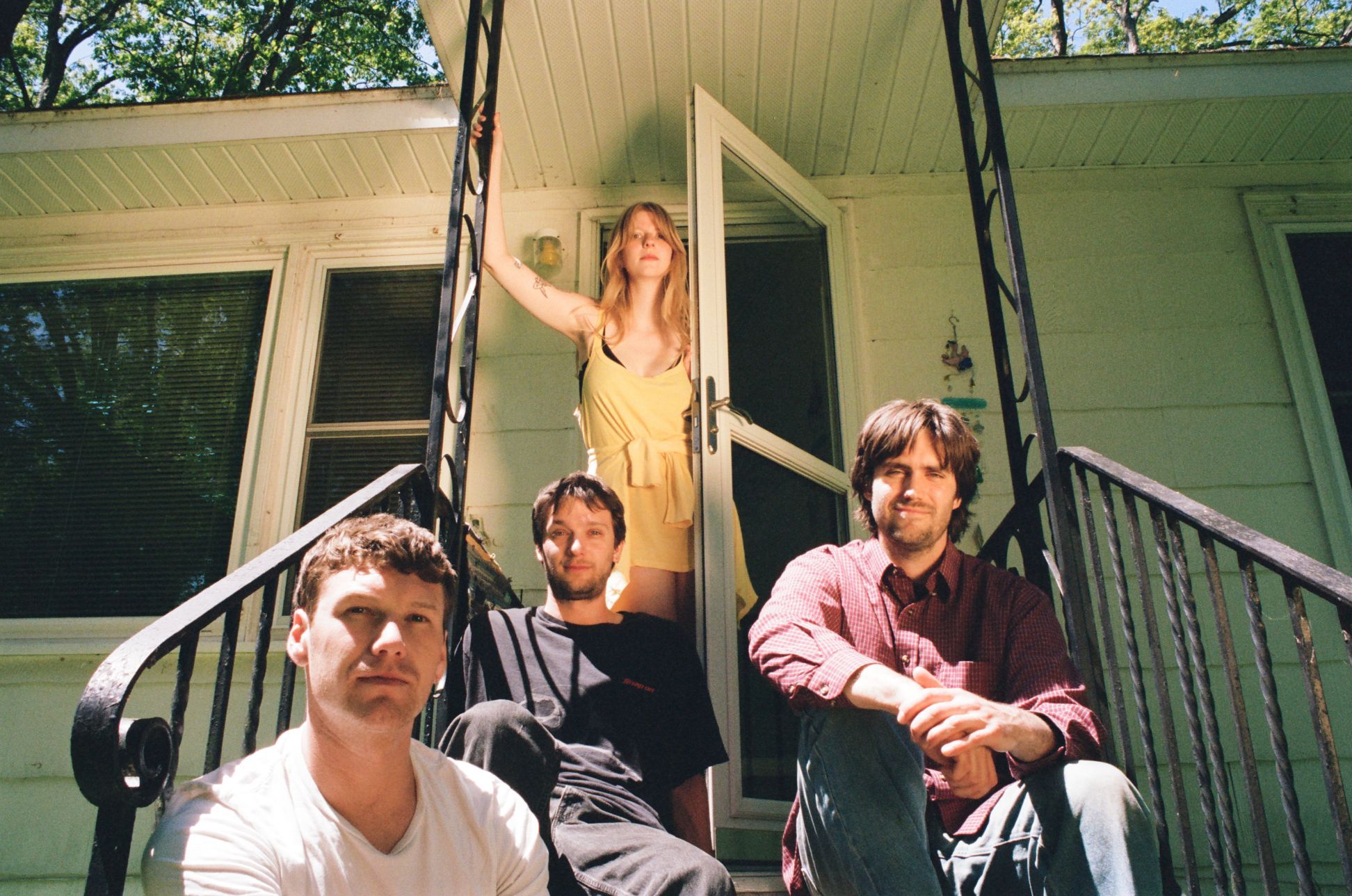
Do you have a favourite song on this latest record?
Oh, I like so many of them. I’m biased. I really love Slugs, it is one of my favourites. I think that song is just so fun and doesn’t take itself too seriously. Which I think is a nice thing. I also really love the song Carina Phone 1000, that song is about my best friend. And so it just has this special connection. And Molly Germer who recorded the violin for that song. When she sent it back I just wept. I thought it sounded so amazing and was the perfect thing for that song. It’s funny because it started with Teddy, the drummer. He came to me with those guitar chords and I’m like, “This sounds like a Goo Goo Dolls song. This is hilarious the way it turned out.” It just came through such a funny arc. But yeah, I love that one, and Yard is very special as well. Those are probably my favourites.
Another thing that I noticed was the way you and the band talk about particular songs. It’s almost like synesthesia. There’s a quote where you’re talking about a silver song and wanting to turn it into a brown or purple song. I want to know more about that thought process and what you mean by that. Do you actually experience synesthesia?
We’ve talked about it. I don’t think any of us do have synesthesia at all. We’ve just gotten this shared language down of how to talk about music. Someone with actual synesthesia would be like that song is not brown or purple at all. But I think we have this way of figuring out how to talk about things in kind of abstract lenses that get us to the core of the idea that we want. Whether it be more energy or vibe-based. Sometimes it’s a landscape – maybe we’ll talk about rolling hills with cows on them. With Doubt, for example, we’re like, “The song sounds like wakeboarding to us.” I can’t even explain it really, it’s just the energy that it evokes.
How do you change the colour of a song then? What goes into all of that?
I feel like that starts to become the production aspect of it. Or maybe how the drum sounds turn out or how the vocals might be cued. I think it’s very subtle, too. The song that you’re talking about is Gone 2. We were confused about the energy of the version that we had. It felt kind of conflicting with what was happening in the song and the way the chords sounded. It was too bright, and it felt too energetic. And we were watching the music video for Scar Tissue by Red Hot Chili Peppers just on silent. And we’re like, “Gone needs more desert energy. More desert brown.” So it became way more dry and kind of sparse.
I get it in a weird way. It does make complete sense.
Yeah [laughs]. Some people will be like, “Oh, I could see that.” But some people could be like, “I don’t know where the heck are you getting that from?” But for the four of us, we somehow aligned on a lot of that type of communication.
You also have a big tour coming up. That sounds really exciting. What can audiences expect when they come out to see you?
Well, we’re rehearsing and arranging all the songs right now. So we also don’t really know. But I think it’ll be the longest set we’ve ever played because we have so much more material to pull from. But we’re just so excited. The last headlining tour was our first headlining tour and it was just so fun to be able to connect with people directly because we released our first album during Covid. During lockdown, we weren’t able to do the proper album cycle. This time around, I’m just so excited to see how people interact with the music and what little things they find in it. We’re just always trying to get better at playing live and figuring out the presentation of the live show. And we’re very excited to get back on the road and do a headlining tour.
Yard is out now.
Interview Kendall Saretsky

